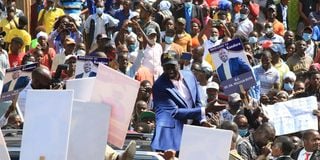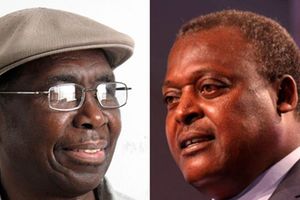Premium
This is the time to move on and fix our democracy

Deputy President William Ruto interacts with his supporters at Kenol town in Murang’a County during a visit on October 4, 2020.
What you need to know:
- Our politics is about name-calling only. In other words, politicians use a communication technique that creates an emotional appeal to their narrow constituencies with the aim of getting them to accept a particular belief.
- Although political scientists have studied the persuasive communication (often referred to as propaganda) that politicians use to endear themselves to the electorate, they are unable to distinguish between objective and non-objective propaganda.
An American musician and songwriter, Carrie Marie Underwood, once said: “Every day is a new day, and you'll never be able to find happiness if you don't move on.”
Similarly, we’ll never be able to find happiness in Kenyan politics until “we the people” decide to move on by fixing our democracy. By this, I don’t mean fixing the Constitution. I mean fixing our behaviour towards politics. Here is why and how.
Our politics is about name-calling only. In other words, politicians use a communication technique that creates an emotional appeal to their narrow constituencies with the aim of getting them to accept a particular belief. The end game is to have their constituencies perform some act, more often voting or causing violence.
Although political scientists have studied the persuasive communication (often referred to as propaganda) that politicians use to endear themselves to the electorate, they are unable to distinguish between objective and non-objective propaganda (propagandistic tactics that are only used for dishonest messaging).
Emeritus Professor at Michigan State University, political scientist and co-author of Propaganda, Communication and Public Opinion, Bruce Smith, for example, affirms this divide as he provided some clarity as to what propaganda means:
Propaganda is communication that is used primarily to influence an audience and further an agenda, which may not be objective and may be presenting facts selectively to encourage a particular synthesis or perception, or using loaded language to produce an emotional rather than a rational response to the information that is presented.
No objectivity
In my view, there is no objectivity in our political class that more often than not ignores facts about themselves and that of their electorate. Without shame, they routinely use these techniques to engage the masses with toxic messaging that creates conflict or violence such as the recent unnecessary political deaths in Murang’a.
Some are blindly advancing a debate around dynasties and a 'hustler' economy without understanding the consequences of their actions, for such narrative formulations could degenerate into a vicious class war that will consume everybody in its wake.
In fact, if that were to happen, none of the 'hustler' community would qualify in what could easily emerge as a Marxist type of revolution. Venezuela, at one time, was a country just about to become one of the developed countries but a misstep by politicians bent on dividing the country gave rise to half-baked Marxists throwing the country into years of stagnation and failure despite having enormous resources.
Often, politicians rarely think that history never repeats itself. But it is possible that what may create a new Africa is a revolution similar to 17th and 18th century Europe where the people were divided between the nobles (upper social class just below royalty with more privileges and social status) and prelates (lower social class referred to as ordinaries) as freely exercised during the feudal order.
In a situation where very few are amassing wealth at the expense of the poor and creating practically an African feudal system (discriminating people along the economic, social and political processes), a class war could explode in the future, particularly if there is no movement towards welfarism or other method of social engineering geared towards protecting vulnerable individuals and segments of the society.
Real issues
Indeed, in feudal Europe, the nobles espoused the principles of constitutionalism (that can be used to sustain some of their natural rights) whereas the ordinaries preferred the Law of Privilege (which provided some entitlements just like the handouts from the political class). Many of those preaching 'hustler' economics, although born into proletariat class, are now nobles through acquisition and appropriation and are trying to wear the prelates’ clothing.
The English Civil War of 17th century, the American war and the French revolution of the 18th century were, in part, an idea of the bourgeoisie to fight feudalism and gain more personal liberties and the right to ownership of property (land that was mostly owned by royalty). To succeed, they had to embrace liberalism to get the support of the ordinaries. This is how both the nobles and ordinaries came to enjoy the economic, social and political rights they enjoy today.
For any leader to gain across class acceptance, they must think big ideas that could eventually unify the country. To get to that level, the divide strategy will not work. One must be seen to be proposing real issues and rally behind a specific cause like eliminating poverty and giving everybody the opportunity to succeed. One must also develop a clear vision, fight apathy by enlightening the electorate to become your foot soldiers in eliminating corruption, seek consensus, avoid deceitfulness and create wealth for the people through informed policy.
Since independence, many politicians have come and gone promising the same things that are never delivered and blaming everybody except themselves. Every voter has come to know the patterns of deceitful politicians. Many accept their antics in return for money. Perhaps this time round we all need to remember the late George Saitoti’s words: "There comes a time when the nation is more important than an individual."
Despite the spirited opposition to imminent political, constitutional, economic and social changes, now is the time to change our country for the better. It is also a very trying moment for the country since very many of those seeking elective office are people with questionable backgrounds (sometimes referred to as pseudo Robin Hoods – who steal from the public and spend part of the wealth in buying the poor to vote for them).
They have perfected the art of using money and communication strategies that will divide the people. There is no progress in a divided people and there is no reason at all to divide the country along a narrow agenda. We are better than those who want division to satisfy their selfish agenda. With great ideas, we can fix our democracy.





